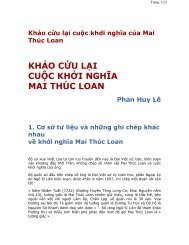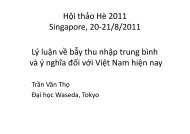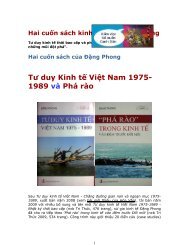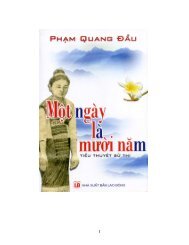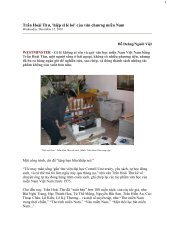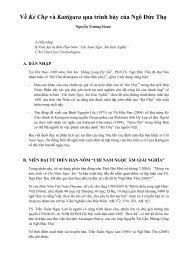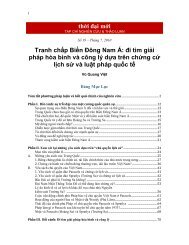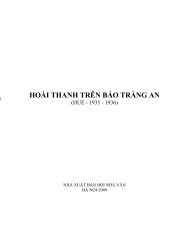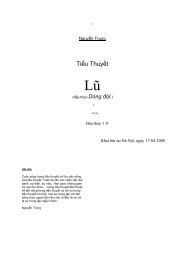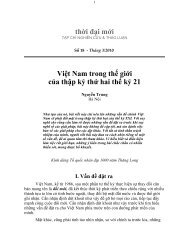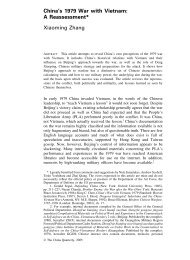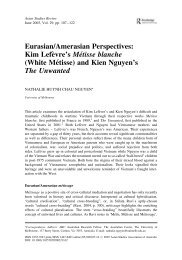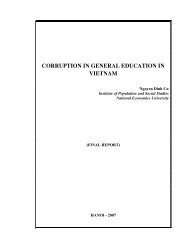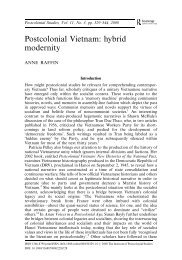John T. McNaughton and Vietnam: The Early Years as ... - Viet-studies
John T. McNaughton and Vietnam: The Early Years as ... - Viet-studies
John T. McNaughton and Vietnam: The Early Years as ... - Viet-studies
Create successful ePaper yourself
Turn your PDF publications into a flip-book with our unique Google optimized e-Paper software.
BENJAMIN T. HARRISON AND CHRISTOPHER L. MOSHER 513<br />
take different versions of what students thought they saw <strong>and</strong> show how<br />
views of the same event can be so different. He would carefully eliminate<br />
the conjectural <strong>and</strong> hearsay evidence <strong>and</strong> tell his students they needed to<br />
stick to the ‘facts always facts’. 93 He saw the war differently than most<br />
others in W<strong>as</strong>hington. He provided facts to McNamara <strong>and</strong> others <strong>and</strong><br />
framed his opinions in such terms that escalation in <strong><strong>Viet</strong>nam</strong> looked<br />
horrendous. However, he would not contradict his boss in meetings.<br />
George Ball observed that, ‘<strong>John</strong> would get me <strong>as</strong>ide <strong>and</strong> say “Gee, I agree<br />
with you, but Bob won’t quite buy this.” ’ 94 He knew he had first to<br />
convert McNamara who could then convert <strong>John</strong>son.<br />
Before the tragic plane cr<strong>as</strong>h that took his life in 1967, <strong>McNaughton</strong><br />
sent McNamara what is perhaps the most quoted document in the<br />
Pentagon Papers. Of that memo, the New York Times journalist Neil<br />
Sheehan <strong>as</strong>tutely observed that ‘only once in the history of the Pentagon<br />
study did anyone in a position of power’ express emotional <strong>and</strong> moral<br />
qualms about the war. That person w<strong>as</strong> <strong>John</strong> <strong>McNaughton</strong> <strong>and</strong> his<br />
6 May memo noted:<br />
A feeling is widely <strong>and</strong> strongly held that the ‘Establishment’ is out of its<br />
mind. <strong>The</strong> feeling is that we are trying to impose some U.S. image on distant<br />
people we cannot underst<strong>and</strong> (anymore than we can the younger generation<br />
here at home), <strong>and</strong> that we are carrying the thing to absurd lengths.<br />
Related to this feeling is the incre<strong>as</strong>ed polarization that is taking place in<br />
the United States with the seeds of the worst split in our people in more<br />
than a century . . . 95<br />
At l<strong>as</strong>t someone w<strong>as</strong> dealing with the moral <strong>and</strong> emotional issues of the<br />
<strong><strong>Viet</strong>nam</strong> War. He w<strong>as</strong> right in that the country w<strong>as</strong> experiencing the<br />
worst polarization since the Civil War. He w<strong>as</strong> right that many believed<br />
‘<strong>The</strong> Establishment’ w<strong>as</strong> out of its mind trying to force the <strong><strong>Viet</strong>nam</strong>ese<br />
people to adopt the American way of life. <strong>McNaughton</strong> concluded that:<br />
‘<strong>The</strong> picture of the world’s greatest superpower killing or seriously injuring<br />
1,000 noncombatants a week, while trying to pound a tiny backward<br />
nation into submission on an issue whose merits are wholly disputed is<br />
not a pretty one.’ He sarc<strong>as</strong>tically told his aide, Townsend Hoopes, ‘we<br />
seem to be proceeding on the <strong>as</strong>sumption that the way to eradicate<br />
<strong>Viet</strong>cong is to destroy all the village structures, defoliate all the jungles,<br />
<strong>and</strong> then cover the entire surface of South <strong><strong>Viet</strong>nam</strong> with <strong>as</strong>phalt.’ 96 His<br />
l<strong>as</strong>t memo outlined a ‘Plan for the Termination of Hostilities in <strong><strong>Viet</strong>nam</strong>’<br />
which proposed negotiations for exit on even unfavourable terms for the<br />
United States. 97 At the same time, McNamara w<strong>as</strong> still telling <strong>John</strong>son<br />
the war in <strong><strong>Viet</strong>nam</strong> could still be won. On 19 July 1967, <strong>McNaughton</strong>, his<br />
93 Halberstam, Best <strong>and</strong> Brightest, p. 363.<br />
94 George Ball oral interview, 8 July 1971, pp. 37–8, LBJL.<br />
95 GPP, iv. 477–81.<br />
96 Townsend Hoopes, Limits of Intervention: An Inside Account of how the <strong>John</strong>son Policy of Escalation<br />
in <strong><strong>Viet</strong>nam</strong> w<strong>as</strong> Reversed (New York, 1969), pp. 50–1.<br />
97 Gibbons Papers, Box 29, File 1, #3, LBJL.<br />
© 2007 <strong>The</strong> Authors. Journal compilation © 2007 <strong>The</strong> Historical Association <strong>and</strong> Blackwell Publishing.



